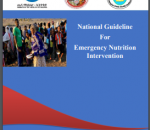National Policy and Program Documents

The Ethiopian Public Health Institute (EPHI) took the lead and developed the national Food-Based Dietary Guidelines (FBDGs) with other food and nutrition strategy-implementing sectors, which are an important source of information for promoting nutrition literacy among consumers, government sectors, and other food system actors towards healthier diets.
We the undersigned, representing the Government of the Federal Democratic Republic of Ethiopia, National Nutrition Coordination Body, fully recognize each ministryÔÇÖs mandate and pledge our commitment to support the achievement of the targets laid out in this National Nutrition Program document and the Seqota Declaration implementation manual.
Ethiopia has undertaken a far reaching program of economic reforms over the last decades and the economy has registered rapid growth rates averaging 11 percent annum over the past seven years placing Ethiopia among the top performing economics in sub Saharan Africa and the government has made poverty and hunger reduction its top priorities
The Ministry of Education is responsible for gearing the younger generation towards better working potential and productivity, equipping students with the necessary knowledge including health and nutrition. To this end, the Ministry has developed a National School Health and Nutrition Strategy
'Infant formula' means breast milk substitute formulated industrially in accordance with applicable standards to satisfy the normal nutritional requirements of infants up to six months of age and adapted to their physiological characteristics.
Following the mainstreaming of the Sustainable Development Goals into the GTP II, the UNDAF is also directly linked to the SDGs relevant to the Ethiopia context. This provides a solid foundation for close collaboration between the Government and the UN system in localizing and rolling out the SDGs during the life cycle of the UNDAF 2016 _2020
Ethiopia has implemented successive Health SectorDevelopment Plans (HSDPs) since 1997 in four phases. During
this period, our country has made huge strides in improving access to health services and improvements in health
This rapid growth performance and its sustainability are primarily the result of the development policies and strategies the Government has been pursuing during the last two decades, as well as 6 the active participation of the public in the execution of these strategies. In 2013/2014, for the first time in the history of the country, its sovereign rating was assessed by three international credit rating agencies.
Ensuring the availability, accessibility, safety and quality consumption of nutritious foods at all times to all citizens is a prerequisite for the creation of a productive workforce, longevity of life, improved livelihood and innova




